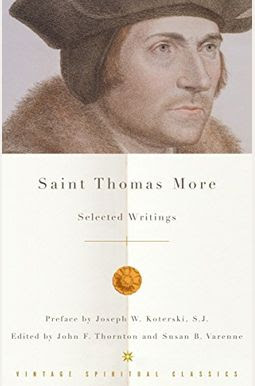Continuing our series on St. Thomas More's "A Godly Meditation" on Monday, March 4, Anna Mitchell or Matt Swaim of the Son Rise Morning Show and I will discuss this next arbitrarily chosen portion of More's prayer.
As you know by now, I'll be on at my usual time, about 7:50 a.m. Eastern/6:50 a.m. Central. Listen live here or catch the podcast later.
More continues his concern with being rid of worldly concerns and delves more deeply into what it means to have his mind set "fast upon" God, including a good examination of conscience and confession of sins:
Give me thy grace, good
Lord,
Not to long to hear of any worldly things,
But that the hearing of worldly fantasies may be to me displeasant.
Gladly to be thinking of God,
Piteously to call for his help.
To lean unto the comfort of God,
Busily to labour to love him.
To know my own vility and wretchedness,
To humble and meeken myself under the mighty hand of God,
To bewail my sins passed.
For the purging of them, patiently to suffer adversity.
Later in this prayer, More refers to "vain confabulations", to avoid making up different versions of reality, imagining himself in different circumstances. He has to face what's happening to him now, face his dependence on God, and face the ways that he has failed to love God throughout his life.
He cannot imagine himself back home at Chelsea with his loving family and friends: the only way he can achieve that it by violating his conscience. He certainly doesn't want to think of himself at Court, trying to influence worldly events: that time has passed. He has already done all he could.
So he turns to God: thinking of Him; calling for His help; leaning on His comfort; working to love Him, mentally, prayerfully, spiritually.
As he strives to become more attached to God, More turns to an examination of conscience, reviewing the sins he committed in the past, repenting of them, and being ready to suffer for them in his current circumstances.
Matt brought up conscience (referring to the Catechism of the Catholic Church) during our discussion last week, and here More prays to know, to humble himself, to become meek, to bewail his sins, and suffer adversity to purge himself of the temporal punishment due to those sins, all by examining his conscience thoroughly.
In his preface to the Vintage Spiritual Classics volume of Selected Writings of Thomas More, Joseph W. Koterski, SJ, highlights More's "practice of a careful and daily examination of conscience in which he had steeled himself since his youth", "reserving a time and place for the examination of conscience", even creating a separate oratory at his home in Chelsea for that meditation.
So, applying this portion of More's "Godly Meditation" to our 2024 Lenten observance, it points us to the Sacrament of Confession. Since Lent is the season of repentance and conversion, the Church highlights the Sacrament of Confession. My local parish has added opportunities for Reconciliation/Penance/Confession throughout the Lent and our pastor just highlighted the need for Confession, not just once a year, but more often, for very practical reasons:
While the requirement is once
a year, the Church encourages people to go to Confession once a month, because
she knows how difficult it is to remember things that happened almost a year
ago. Along with that, the less often we go to Confession we lose our sense of sin
and then we do not clearly see sins that we might see if we regularly examine our
conscience and bring ours sins to the sacrament of mercy. (Blessed Sacrament Catholic Church March 3 Parish Bulletin.)
And although More may have been faithful in his examinations of conscience and Sacramental Confessions, he admits that he still needs to make up for the consequences of those sins, so he is willing to endure suffering to expiate them. As another English saint, John Henry Newman, wrote in a Lenten sermon when he was an Anglican:
Let us be wise enough to
have our agony in this world, not in the next. If we humble ourselves now, God
will pardon us then. We cannot escape punishment, here or hereafter; we must
take our choice, whether to suffer and mourn a little now, or much then. (PPS "Lent, the Season of Repentance.")
Saint Thomas More, pray for us!
Saint John Henry Newman, pray for us!

No comments:
Post a Comment